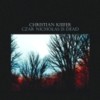 Christian Kiefer’s latest album is a mostly instrumental exploration of the Russian revolution. Among other instruments, he uses guitar, strings, and field recordings to create a stunning work both vivid and haunting in its cinematic evocations.
Christian Kiefer’s latest album is a mostly instrumental exploration of the Russian revolution. Among other instruments, he uses guitar, strings, and field recordings to create a stunning work both vivid and haunting in its cinematic evocations.
Kiefer sets the scene with "Yurovsky’s Lament," a mysterious and melancholic foreshadowing of events to come with its swooping drones and ominous guitar. Chirping crickets crossfade into the next track, one of the many layers of field recordings that lend the music a visual quality. Likewise, the closing latches or doors of "On Suffering Grief," the birdsong, the barking dog, and the mimicked horse trots of "Dubinushka," as well as the radio intercepts of "The Politburo Dreams of the Urals" can’t help but fire my imagination as if I’m listening to a film that’s playing in the next room, yet these subtle elements never overshadow the songs themselves. The music does its part to further the narrative with the snappy percussion of "The Firing Squad" or the peaceful "Koptyaki Road, Night."
It’s not all gloom and sadness here, either. In addition to the calm of "Koptyaki Road," "Kalmykov (Poppies)" unfurls into a stately—if not optimistic—supplication. Even "On Suffering Grief" reflects a carefully ordered worldview of acceptance rather than tragedy or betrayal. The only vocals on the album come on the interpretation of a Russian folk melody, "Troika." On it the harmonizing vocals are accompanied by drums that could signal both a death march and gunshots in the album’s harrowing finale.
Kiefer does a remarkable job of shifting moods and atmosphere to maintain the album’s energy, wrapping me in a dream with several signposts but few absolutes, ensuring a different imaginative landscape with each listen.
samples:
 
Read More

